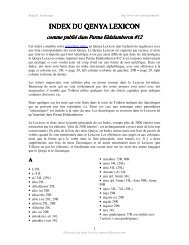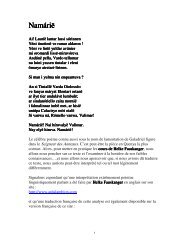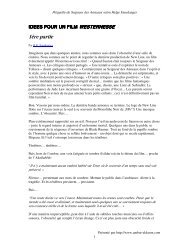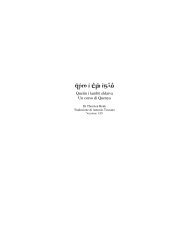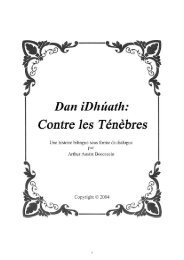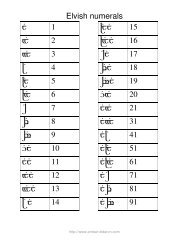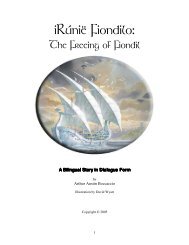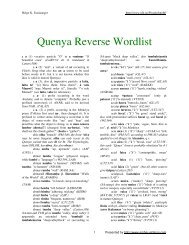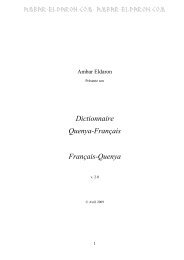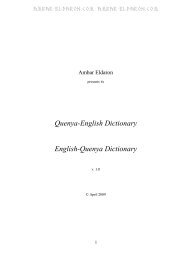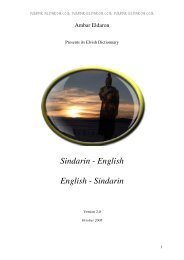English – Quenya - Ambar Eldaron
English – Quenya - Ambar Eldaron
English – Quenya - Ambar Eldaron
You also want an ePaper? Increase the reach of your titles
YUMPU automatically turns print PDFs into web optimized ePapers that Google loves.
Helge K. Fauskanger http://www.uib.no/People/hnohf/<br />
CLAW atsa (hook, catch), nappa, namma<br />
(talon), #racca (isolated from raccalepta, see<br />
below); CLAW-FINGERED raccalepta <strong>–</strong>GAT,<br />
VT47:20, SD:68, 72<br />
CLEAN poica <strong>–</strong>POY<br />
CLEARED (of land) latin, latina (free,<br />
open) <strong>–</strong>LAT<br />
CLEAVE #hyar- (cited in source as hyarin<br />
"I cleave", 1st pers. aorist), pa.t. probably<br />
*hyandë given the form of the root. CLEAVER<br />
#hyando in Sangahyando (Þ) "Throng-cleaver,<br />
Cleaver of throngs" <strong>–</strong>SYAD, LT2:342, LotR:1085<br />
cf. Letters:425<br />
CLEAVE TO himya- (abide by, stick to,<br />
adhere) <strong>–</strong>KHIM, VT45:22<br />
CLEFT yáwë (ravine, gulf/gully); sanca<br />
(Þ) (split), hyatsë (gash), ciris (probably ciriss-)<br />
(crack), falqua (mountain pass, ravine), cilya<br />
(gorge, pass between hills) (so in Etym, but<br />
cirya in the name Calacirya "Pass of Light"<br />
[gen. Calaciryo in Namárië] <strong>–</strong> though this<br />
clashes with cirya "ship". An early version of<br />
Namárië actually had Calacilyo, not Calaciryo;<br />
see An Introduction to Elvish p. 5.) <strong>–</strong><br />
YAG/VT46:22, STAK, SYAD, RGEO:70/WJ:403,<br />
LT2:337, 341, KIL<br />
CLIFF ollo (seaward precipice) (The<br />
alternative form oldó may be archaic <strong>Quenya</strong>.) <strong>–</strong><br />
LT1:252<br />
CLOAK colla (vestment, actually a past<br />
participle "borne, worn" used as a noun). GREY-<br />
CLOAK Sindacollo, Singollo (so in Silm:421;<br />
MR:217 has Sindicollo. Note that colla has<br />
become #collo because <strong>–</strong>o is a masculine<br />
ending.) (Thingol). Verb "to cloak": fanta- (to veil,<br />
mantle) <strong>–</strong>MR:385, VT43:22<br />
CLOSE holta- (shut); CLOSED pahta<br />
(NOT CLOSED <strong>–</strong> see OPEN) <strong>–</strong>PE17:98,<br />
VT39:23<br />
CLOTH lannë (tissue) <strong>–</strong>LAN<br />
CLOUD fanya (white cloud; pl. fanyar is<br />
attested), lumbo (pl lumbor is attested. In<br />
LT1:259, it is stated that this word applies to a<br />
"dark lowering cloud"), ungo (dark shadow). (In<br />
ancient times the Elves probably also used the<br />
word fana [in Etym fána] for "cloud" or "veil", but<br />
in <strong>Quenya</strong> it came to denote the visible bodies in<br />
which the Valar manifested themselves to<br />
incarnates. When fana no longer meant "cloud",<br />
this meaning was evidently transferred to the<br />
derivative fanya, originally probably meaning<br />
"white" or as noun "white thing".) UPPER AIRS<br />
AND CLOUDS fanyarë (skies) <strong>–</strong>SPAN/VT46:15,<br />
MC:222, UÑG, Nam, RGEO:67, SYAD,<br />
RGEO:74, MC:223<br />
CLUSTER loxë (bunch). Note: a<br />
homophone means "hair". (QL:55).% CLUSTERS<br />
(of flowers) see BLOSSOM.<br />
COAT vacco (jacket) <strong>–</strong>GL:21<br />
COBWEB línë <strong>–</strong>SLIG<br />
COCK tocot <strong>–</strong>PE14:132<br />
CODE OF SIGNS tengwesta (system of<br />
signs, grammar); GESTURE-CODE hwermë <strong>–</strong><br />
WJ:394 cf. TEK, WJ:395<br />
COITUS puhta (specified to be "one act";<br />
a more general word for "sex" could perhaps be<br />
derived by adding an abstract or generalizing<br />
ending like -lë) <strong>–</strong>PE13:163<br />
COLD (adj) ringa (so in MC:222 and<br />
LT1:265; Etym has ringë, stem *ringi-), (damp,<br />
chilly), yelwa (but this is glossed "loathsome"<br />
elsewhere). IT IS COLD Ringa ná (VT49:23).<br />
COLD (noun?) niquë, also vb niquë- "it is cold,<br />
it freezes"; COLD POOL OR LAKE (in<br />
mountains) ringwë (in the Etymologies as<br />
printed in LR, this word is cited as "ringe", but<br />
according to VT46:11, ringwë is the proper<br />
reading), BE COLD, CHILL (of weather) nicu- <strong>–</strong><br />
MC:222, RINGI/VT46:11, LT1:260, WJ:417<br />
COLLAPSE (vb) talta- (slip, slide down),<br />
COLLAPSE (noun) atalantë (downfall) <strong>–</strong>MC:223<br />
COLLECT hosta- (gather, assemble);<br />
COLLECTION OF LEAVES olassië (foliage).<br />
GREAT COLLECTION OR CROWD OF<br />
THINGS OF THE SAME SORT úmë (not to be<br />
confused with the pa.t. of the negative verb "not<br />
be, not do"). <strong>–</strong>KHOTH/MC:223, Letters:282,<br />
VT48:32<br />
COLOUR quilë (hue) <strong>–</strong>QL:77%<br />
COME #tul- (cited in source as tulin "I<br />
come", 1st pers. aorist); perfect #utúlië and<br />
future #tuluva are attested (the latter with the<br />
prefix entuluva "shall come again". Tulin may<br />
obsolete tulu- in LT1:270). COME AWAY hótuli-<br />
("so as to leave a place or group and join<br />
another in the thought or place of the speaker") <strong>–</strong><br />
TUL, LotR:1003, Silm:229, WJ:368<br />
COMFORT (verb) tiuta- (console),<br />
COMFORT (noun) tiutalë (comfort, consolation,<br />
easement) <strong>–</strong>QL:93<br />
COMMAND (verb) *can- (so when used of<br />
persons; when used with things as object, this<br />
verb means demand) <strong>–</strong>PM:361-362 (where the<br />
stem KAN is mentioned; the <strong>Quenya</strong> verb is not<br />
directly cited as such, but seems implied by<br />
Tolkien's discussion of how this stem was used<br />
in <strong>Quenya</strong>.) For “command” as a noun, see<br />
ORDER.<br />
COMMANDER cáno ("usually as the title<br />
of a lesser chief, especially one acting as the<br />
Wordlist last updated July 5th, 2008 16 Presented by http://www.ambar-eldaron.com



